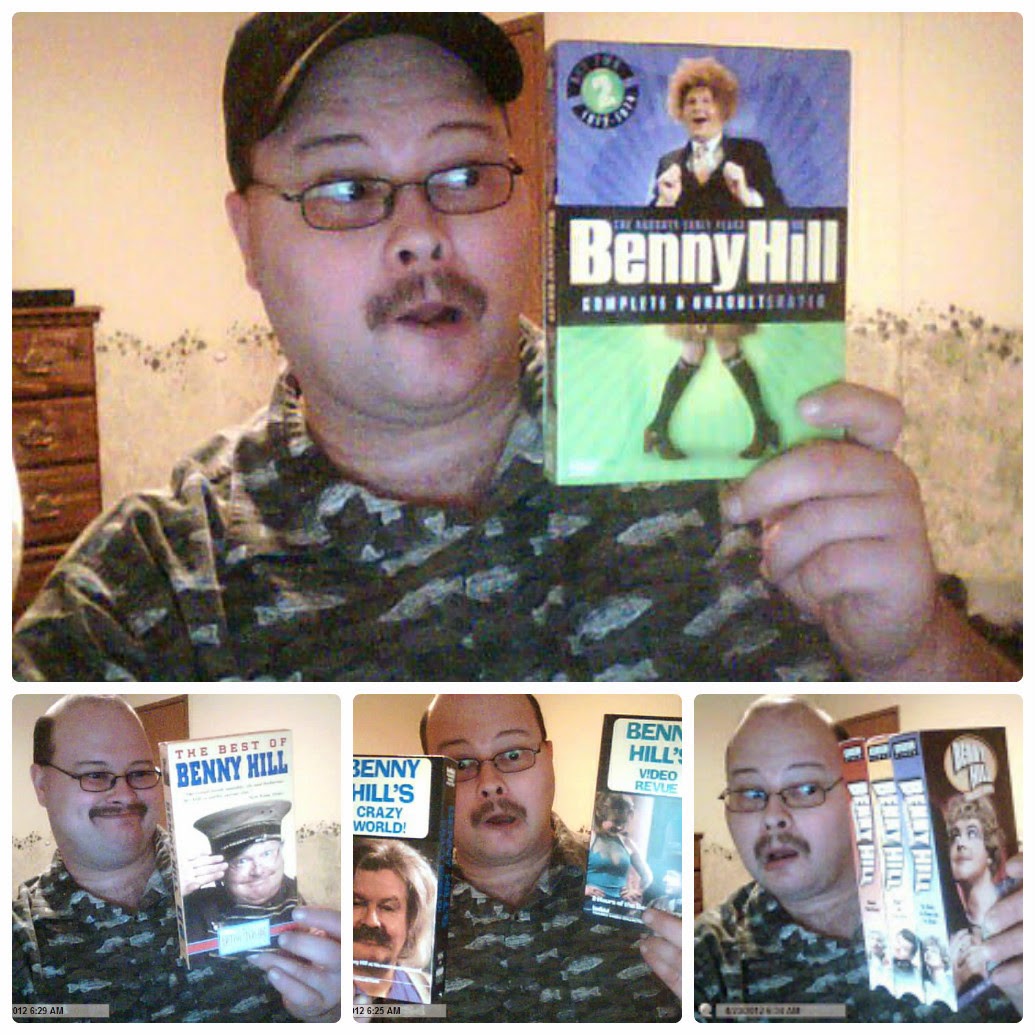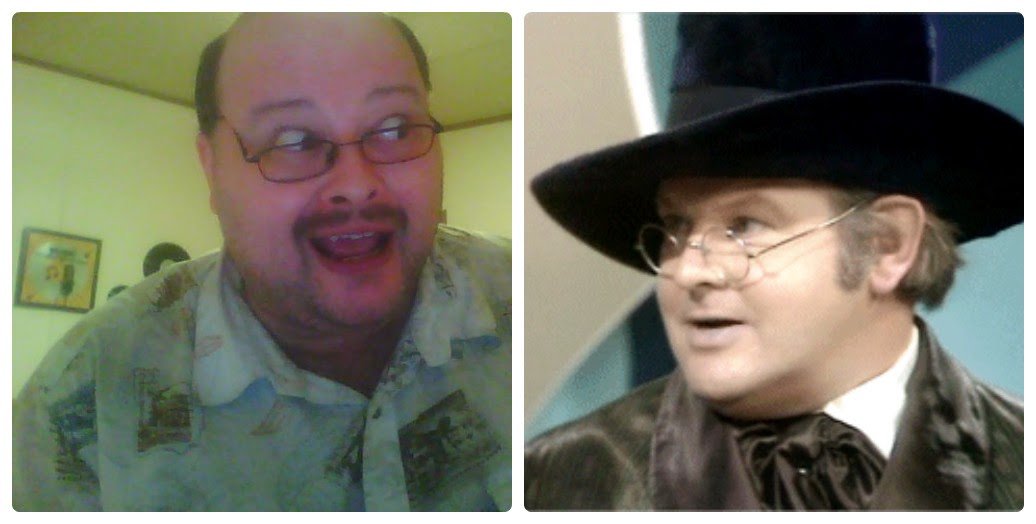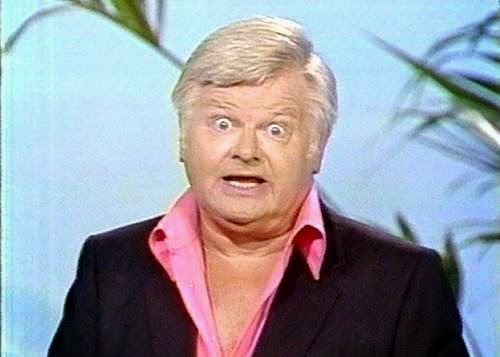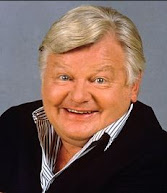I couldn't let 2014 go by without making mention of the 90th anniversary year of Benny Hill's birth. Born in January 1924 and passing away in April 1992, Benny Hill became one of the biggest comedy icon's of all-time (in my opinion). Originally rooted in verbal comedy and parody, seek out the black and white episodes Benny did for the BBC in the early part of his television career. Those episodes appear in a series called
Benny Hill: The Lost Years. I have the VHS release...I don't have the DVD counterpart.
Benny's humor after leaving the BBC eventually became much more slapstick and pantomime, a move that guaranteed his programs to be universal given the elimination of a language barrier. Those programs became a hallmark of the Thames Television-era. Those programs (several specials broadcast throughout the year) were packed with bizarre poems, elaborate song and dance segments, all styles of comedy (both spoken and visual), and a fondness for theatrical staging created a Vaudeville-era showcase and a throwback to traditional comedy during a time when younger English comedians were embracing a so-called modern style of humor. Benny's age at the time of his first Thames production in 1969 was 45 and as the following decade opens we reach the mid 1970s and Benny's television specials are remaining enormously popular. After 10 years at Thames (1979) and numerous one-hour comedy specials, a decision is made to syndicate Benny's programs for American audiences.
In America the Benny Hill programs aired as half hour clip-filled presentations of sketches that originated during the first 10 years of the Thames TV association. The series ran in late night time-slots (or early morning time-slots, just before sunrise) on hundreds of local television stations in America. The hodgepodge look of the clip-filled series and the fact that Benny's age changes dramatically from sketch to sketch added to the uniqueness and appeal. Those at Thames TV and even Benny himself are quoted as being in disbelief that the programs attracted such a strong audience and fan base in America...but once the series became a smash hit in syndication in America it was like the floodgates opened up and from 1979 onward Benny Hill seemed to rule international humor...even though he'd been a big hit on British television since the 1960s. Yes, if you're keeping track, the year that Benny's sketches came to America in 1979 he was 55 years old. As I mentioned earlier, due to the American aired episodes being a compilation package, his age fluctuated 5-10 years within a single half-hour episode.

All the while Benny's sketches were entertaining millions of Americans and millions in Europe and millions of television viewers all over the world, he continued doing his usual sporadic television specials for Thames TV each year. Every year the half hour syndicated programs in America often gained new material annually as current sketches from then-recent Benny Hill specials continued to be woven into episodes that featured older sketches. By the mid 1980's the syndicated episodes looked even more distinct and by then Benny had turned 60 (in 1984). It is during the 1980's that the famous, or infamous, Hill's Angels made their debut. The Hill's Angels are the name of the group of women that appeared in many song-and-dance routines (often with Benny playing the part of the bum, the loser, or the easily excited spectator...typically all three rolled into one!). The name, Hill's Angels, has sort of retroactively come to identify all
the beautiful women/models that appeared on his programs over the
decades even though the name itself never came into being until the
1980's.
The Angels also played heavily in the sped-up silent sketches...a filmed segment that appeared on all the Thames TV episodes...and often it consisted of Benny and his familiar co-stars (Henry McGee, Jackie Wright, Bob Todd). A typical presentation starts out calmly and eventually works itself into a frenzied display of sight gags. It's in these sped-up presentations that one of the most memorable sight gags became immensely popular and referred to by many viewers as "the slapping of the head of the little bald guy".
The sped-up presentations make generous use of camera tricks (called under-cranking) and those appear at various moments in any number of episodes. In the closing segments of his programs, often a sped-up gag reel, the action is played under the saxophone solo of Boots Randolph's "
Yakety Sax" as Benny eventually is chased by everybody he meets as the credits roll.
As the 1980's progressed, more and more younger comics were starting to come out of the woodwork and many of them had a much different style of comedy. In the mid-late '80s several British comedians seemingly took it upon themselves to launch into anti-Benny Hill tirades. Feminists received a much louder voice and the language-stifling unofficial censorship policy, popularly known as political correctness, played a part in Benny's eventual cancellation at Thames TV in 1989.
By that time Benny had started to incorporate a lot of cute humor into the sketches...lots of children become part of the sped-up sketches...and in typical fashion Benny allowed the other people in the comedy sketches to come out as the winner. As mentioned earlier, Benny usually always played the bum, the loser, the fall guy, the bad luck charm. In any comical sketch in which Benny seemed to be coming out on top of a situation, something always happened to change his fate. If he happened to be a pirate and stumbled upon a chest...he'd visually relish the idea of being rich...only to open the chest and find a sign that read "It's Lonely In Here!" and he'd make one of his famous comical expressions at the camera, start crying, and the scene would cut to something else. Another sight gag one might see is of Benny spraying deodorant under his arms and then suddenly noticing huge paint spots in his arm pits...often leading to this classic facial expression...

Silent movies were a huge inspiration to him and that's evident right from the start of his television career. He was the recipient of a prestigious Charlie Chaplin award in 1991. In the BBC era Benny often presented films from a fictional character named J. Arthur Clinker, billed as "the fastest film maker". Benny's straight-man in the BBC telecasts was Jeremy Hawk (a role later taken up by Henry McGee during the Thames TV era).
I research a lot and a couple of years ago I came across several articles originally printed in British newspapers that featured younger comedians making disparaging remarks about Benny's style of comedy and it's "old-fashioned" look. The thing that baffled me is the idea of a comic viciously attacking another comic. Isn't it kind of an unwritten rule that comics are all in it together...creating laughter? Unless there are 2 comedians engaging in a mock-feud (like Fred Allen and Jack Benny), it seems kind of crude for one comedian to bash another on the merits of what's funny. Humor is subjective...thankfully.
After the cancellation of the Thames TV contract in 1989, Benny's syndicated television programs in America eventually came to an end even though a couple of local stations in my area continued to air repeats of the clip-fests into the early 1990s. A local ABC station in Columbus aired the program in the overnight hours (late Saturday, early Sunday) opposite the last half hour of
Saturday Night Live on NBC. Another station aired the program at an even later time-slot on Sunday mornings. Benny's fame in America led to a 1991 television special taped in New York. It's official name is
Benny Hill's World Tour: New York. It was filmed/taped on-location in the spring of 1990 but it aired early in 1991 on the USA cable channel. It became the first and
only hour long Benny Hill television special to originate outside of England.
It was going to be part of a "World Tour" series but only the New York special became a reality...his health played a deciding factor in the non-materialization of the other proposed specials (I touch on that later in the blog).
The television special proves that he was in top comic form...and there are several video clips of sketches from the 1991 television special on YouTube. One of the funniest is the Rap Song...
In the meantime, one of the hallmarks of burlesque and early stage comedy in general is the female impersonation by men. Modern audiences think "female impersonations" and perhaps instantly think of people described as Drag Queens. Centuries ago men dressed up as women for laughs and females often played the part of young boys (even today, a lot of young boys on cartoons are often voiced by females). It's almost impossible for people today to rationalize this kind of humor. Those that have no knowledge of burlesque humor (particularly Victorian burlesque of the 19th century) and therefore have a lack of understanding of it's comical value are typically confused or at a loss for words. Some people ignorantly proclaim that comics that dressed up as women must be closet homosexuals or something. I hardly suspect Milton Berle, for example, to have been a closet homosexual. He dressed up in female attire plenty of times for comic effect. The cartoon character, Bugs Bunny, famously put on dresses, lipstick, and heavy mascara in many attempts to ridicule Elmer Fudd's befuddled dopiness and apparent shyness around females.
Look up Victorian burlesque or read up on English music hall comedy and you'll immediately notice Benny Hill's biggest inspiration. He not only played the roles of Princesses and Queens but also of Kings, Dukes, Princes, and court jesters.

In February 1992 Benny Hill had a mild heart attack. Reports state he refused to change his eating habits or his lifestyle...and eventually this led to his death at the age of 68 in April 1992. It's been reported that on the very day he died a contract arrived in the mail for even more television specials. One can assume that these specials would've aired throughout 1992 and into 1993 and possibly beyond that point in time but as it turned out only the New York program surfaced in early 1991. After his death millions of people obviously mourned it...fans, friends, and extended family members alike. It's not a secret that Benny passed away in the midst of social controversies surrounding his brand of humor and many believe the cancellation of his Thames TV contract played a factor in his death considering that the television specials were "his life" and once he had "nothing to live for" he started to lose the desire to carry on. The New York television special doesn't play into that narrative, though. I've seen bits of the 1991 special and I didn't see a man torn apart or in misery...to my eyes it was the usual Benny Hill up on the screen...making faces, rolling his eyes, dancing and prancing around, and delivering one joke after another. In the 20+ years after his death the home video and later, the DVD market, became commercial avenues for Benny's legacy. The VHS home videos featured comedy sketches, at random, from the Thames TV specials that Benny did during the latter half of the '70s and into the '80s. The DVD series, titled
Complete and Unadulterated, contained actual full length programs from Benny's earliest years on Thames TV. The actual programs themselves featured a mix of previously filmed sketches, live sketch performances, singing, and dancing...including Benny coming onto the stage at the beginning and talking to the audience. As mentioned, the half hour edited programs that aired in America starting in 1979 contained none of the monologues, singers, or other trappings of a variety program. The syndicated programs that aired in America contained one sketch after the other after the other...maybe featuring a comical patter song from Benny, too, to break up the sketch formula...but that's it. The full length episodes are a revelation to those only familiar with the edited half hour clip-fests that aired on American television stations for more than 10 years.
Enjoy the pictorial salute...I start things off displaying one of those A&E DVD releases of the Benny Hill program...in the image at the bottom right I display the VHS tapes of his BBC programs. Those episodes are all in black and white. Located on one of those tapes is a hilarious parody of "
Bonanza" titled Bo-Peep. Benny, thanks to camera tricks, plays the parts of Ben Cartwright, Little Joe, and Hoss. Patricia Hayes, one of Benny's earliest supporting players, plays the part of Bo-Peep. She accuses the sons of stealing her sheep. In yet another sketch during the BBC era Benny does an exaggerated spoof of Mick Jagger and the rest of the Rolling Stones.

In another sketch found on one of the VHS tapes Benny parodies television commercials (one of his favorite routines) and in a sped-up film by fictional J. Arthur Clinker we're all treated to a surreal and bizarre film spoofing melodrama's and action-adventure films. The film is made so fast that there's misplaced edits, strange camera angles, problems with the film's speed (jumping from slow motion to uptempo, back and fourth). During a crucial moment in the story, Benny's character attempts to pour out his feelings but his dialogue skips due to the unnecessary editing. As stated, J. Arthur Clinker truly is the fastest film maker in the world. In the first picture in the bottom row, that VHS tape consists of another J. Arthur Clinker 'masterpiece'. This time around it's from one of the Thames TV episodes and it features Benny as a love-struck passenger on a ship. Nicholas Parsons appears as Benny's rival. In this sketch there's a hysterical scene where the line "why didn't you tell me you were a second class passenger?" is shot and re-shot multiple times...each successive take is performed in a much slower tempo than before. If you look close enough, during one of the last slow takes of the phrase, you'll see Benny struggling not to break out laughing.

In some of the collages, as you can see, I posted images of myself next to Benny. On my Facebook page I have an image of myself saluting, as Benny Hill, and I recently took the image and placed it side by side with an image of Benny saluting in the same manner. Some of the collage site's special features enabled me to be somewhat creative but I didn't explore each and every special effect available. Up next is a series of collage's that I put together recently. There's one that I deliberately put together to spotlight the burlesque side of his comedy and the female impressions. I didn't come across any suitable pictures of any of his supporting players in drag although I've got video of sketches that have Jackie Wright all dressed up in high heels and a long wig and one unforgettable sketch featuring Henry McGee in a blue dress, pearl ear rings and matching necklace, and donning a tight curly wig.

This is by no means a complete representation of Benny Hill's female impersonations. At various moments in his programs, both on the BBC and for Thames TV, he often impersonated movie actresses and political figures. Some of the usual targets happened to be Elizabeth Taylor, Margaret Thatcher, and Mae West. In the four pictures to the left, Benny is dressed up as non-celebrities. Often the females happened to be nags or holier-than-thou...or scheming gold-diggers. In his series of commercial parodies he often played the part of the housewife demonstrating numerous items found in the kitchen, laundry, or the bathroom. One of the BBC sketches featured Benny as both Richard Burton and Elizabeth Taylor and later as Mae West and W.C. Fields. Much later, during the Thames TV era, Benny brought back his impression of Mae West and W.C. Fields many more times in comical encounters. As far as the female vocals it typically depended on the kind of female. Most of the nagging wives had a high pitched, irritated voice. The snooty females all had a similar vocalization that played into that type...complete with haughty laughter and an arrogant demeanor about themselves and others. The larger picture seems to come from a soap opera spoof...and in those sketches Benny played the females as overly dramatic and prone to breaking into tears very easily. In that larger image the character looks as if she's thinking of some sort of scheme to either break up a relationship or enter into one. The image at the top left appears as if Benny applied the snooty/aristocratic vocalization to that character.

I don't have any information as to the year this picture happened to originate but based on the light colored shirt and his hair I'd say this is from an interview session he did at some point in 1990 or 1991. There's a VHS tape titled
Benny Hill: The World's Favorite Clown, which surfaced in 1991. I have the VHS tape and I also have it on DVD. It's a special bonus feature on one of the A&E releases. There's another documentary on Benny that also makes an appearance as a bonus feature on another A&E disc. That particular documentary originally aired as part of A&E's
Biography series, hosted by Peter Graves. The official title of that episode is called
Benny Hill: Laughter and Controversy. In each documentary surviving supporting players and behind the scenes people give their thoughts on Benny and near the end of each documentary the supporting players offer their feelings on the shabby treatment his career received at the end of his life by television critics (ironically those that lived in England) and the accusations his humor obtained by a host of younger comics in England at the time. Benny, himself, takes part in the 1991 documentary and offers his thoughts of Thames TV ending his contract. He doesn't say anything too harsh but others do. In addition to those documentaries (both of them I strongly recommend) and in addition to the DVDs, there's also several books on the market about Benny. I personally do not have any of those books...I've not come across any review that has convinced me that any of the available books are accurate and lovingly written. I refuse to purchase anything that puts Benny in a negative light.

Let's all mug for the camera, shall we?? I don't necessarily like the idea of being approached by somebody (Benny) whose carrying a syringe. He didn't numb my mouth...the syringe is just for looks I found out. It appears as if the same thing happened to that poor woman (Benny)...she couldn't even tolerate the canned pasta on her table. You can click the smaller collage's for a bigger view. Did Benny Hill have any recurring characters? For those that might be wondering...the answer is yes! In addition to the previously mentioned fastest film-maker, J. Arthur Clinker. Benny also had a long-running character by the name of Fred Scuttle. This character is typically the one that did the backhanded salute across the forehead but the gesture soon started to make it's way onto any sketch regardless of character but it's Scuttle that I happened to see do the gesture the most often during his introductions. Scuttle is often in the sped-up silent sketches, too. Another character is Chow Mein. This character, a parody of the Chinese, often mangled the English language and exchanged in confrontational conversations (most often with Henry McGee). Typically Chow Mein grows frustrated by McGee's inquisitive nature and his habit of repeating everything back to the viewers. This causes Chow to growl in irritated cadence: "why must you repeat e'erything..." followed by the most popular catchphrase, "you stoopid iriot" (English translation: "you stupid idiot!"). Sometimes another supporting player, Bob Todd, appears along side Benny as a character named Cookie Boy (a cook at one of Chow Mein's fictional restaurants). Another long running character, Ted Tingle, often appeared as a storyteller and a poet...delivering poems and patter song with a thick Cockney accent.
I hope more and more people discover Benny Hill as time goes by. Thanks to the internet it's easy to search for his comedy and seek out others that enjoyed his humor for the sheer happiness it brought. To over-think and over-analyze Benny's style of humor is doing a disservice to it's intention. It's not hard hitting, satiric humor in the same category of those that are in the David Frost tradition. Benny's humor allows one to embrace their inner silliness and laugh at life's experiences and see the absurdity in a lot of everyday situations. In his own kind of way he was a trailblazer...he's one of the first British comics to explore television's capabilities. Benny may have been the only British comic of his generation to embrace television and not look at it in a scornful manner (as film and stage comics tended to do).
Simply put, Benny's humor will last as long as people enjoy laughing.
 |
| Benny Hill: 1924-1992 |
































